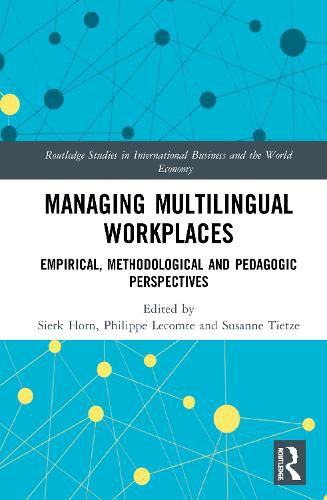Readings Newsletter
Become a Readings Member to make your shopping experience even easier.
Sign in or sign up for free!
You’re not far away from qualifying for FREE standard shipping within Australia
You’ve qualified for FREE standard shipping within Australia
The cart is loading…






This book sets new trajectories for language-sensitive business and management research and pedagogy. The existence of language plurality characterises these. Empirical studies have been established as important and relevant for contemporary research. It has shifted language-sensitive research from the periphery to the centre of international management research. However, this field is rapidly changing, and new thematic approaches have begun to emerge. By addressing this, the book offers genuine and more nuanced insights into existing themes and comes with applications of emergent conceptual developments in different settings. The second part of the book covers methodologies and gives examples and cutting-edge insights into the role of translation in the execution of empirical research and theorising arising from it. Finally, the book draws together innovative ways of how to address the challenges of a multilingual teaching classroom and how to innovate in order to incorporate such diversity through pedagogic practice.
This book provides a source that unites insights from multilingual empirical research, methodological considerations and pedagogic practice in order to advance knowledge and debate. It will be a ‘handy source’ of information that offers direct access to the latest guidance on language-sensitive management challenges. It will, therefore, appeal to an internationally-minded and mobile audience, including scholars, students and decision-makers.
$9.00 standard shipping within Australia
FREE standard shipping within Australia for orders over $100.00
Express & International shipping calculated at checkout
This book sets new trajectories for language-sensitive business and management research and pedagogy. The existence of language plurality characterises these. Empirical studies have been established as important and relevant for contemporary research. It has shifted language-sensitive research from the periphery to the centre of international management research. However, this field is rapidly changing, and new thematic approaches have begun to emerge. By addressing this, the book offers genuine and more nuanced insights into existing themes and comes with applications of emergent conceptual developments in different settings. The second part of the book covers methodologies and gives examples and cutting-edge insights into the role of translation in the execution of empirical research and theorising arising from it. Finally, the book draws together innovative ways of how to address the challenges of a multilingual teaching classroom and how to innovate in order to incorporate such diversity through pedagogic practice.
This book provides a source that unites insights from multilingual empirical research, methodological considerations and pedagogic practice in order to advance knowledge and debate. It will be a ‘handy source’ of information that offers direct access to the latest guidance on language-sensitive management challenges. It will, therefore, appeal to an internationally-minded and mobile audience, including scholars, students and decision-makers.